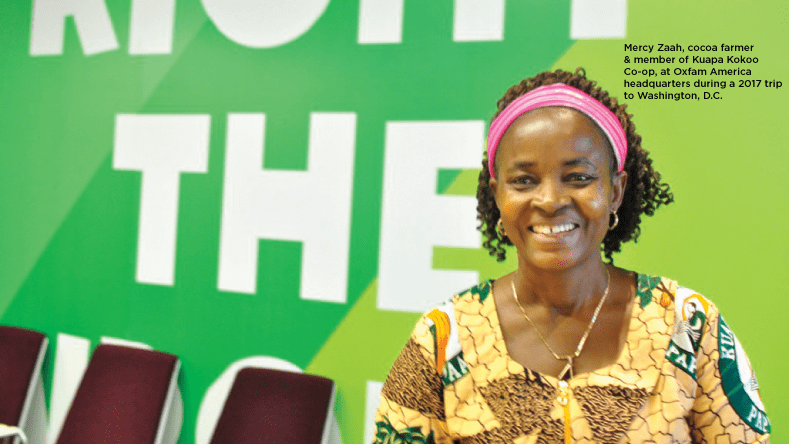In March 2017, Divine Chocolate welcomed to the United States Mercy Zaah, a cocoa farmer from Ghana who was visiting as a representative of Kuapa Kokoo, the farmers’ co-op that co-owns Divine Chocolate. She helped commemorate the company’s past decade of achievements in both sales growth and gender equality by participating in key meetings and events. Divine Chocolate and Kuapa Kokoo, both led by women, are pioneering progress toward Sustainable Development Goal 5, which aims to achieve gender equality and women’s empowerment. In support of these values, Zaah spoke about how her life is directly impacted by Divine’s commitment to inclusion and giving women cocoa farmers a voice.
As a part of Mercy Zaah’s visit to Washington D.C., she participated in a round table discussion coordinated by Divine Chocolate and co-facilitated by Oxfam America and Fairtrade America entitled: “Gender Equality, Women’s Empowerment & the Global Value Chain.” In addition to Divine Chocolate, participants included staff from:
World Cocoa Foundation
Winrock International
Women Thrive Alliance
Landesa Rural Development Institute
National Cooperative Business Association CLUSA
Fintrac Inc.
Prior to the discussion, Ms. Zaah gave an inspiring presentation on the lengthy and arduous process of cocoa farming, the importance of empowering women cocoa farmers, and the ways in which Kuapa Kokoo’s and Divine Chocolate’s fair trade mission has worked toward creating gender equality in cocoa farming.
“Kuapa Kokoo has ensured that women have more representation at levels,” Ms. Zaah explained. “The co-op encourages women to launch and join women’s groups. It also provides equal access to training, education, and family support. Women have been empowered by learning other modes of income generation and diversification such as tie-dye shirt making, hand soap making, t-shirt printing and so many other trades when cocoa is out of season.”
As Ms. Zaah’s presentation continued, she further demonstrated the various outcomes of empowering women farmers who also manage the care and well-being of their children, homes, and communities at large.
“Divine has given women a voice and the ability to connect with key players in the industry, exemplified by my being here with you today,” she continued. “Through the benefits of fair trade, we now have literacy and numeracy classes, access to clean water in our village, toilet facilities and more classrooms so our children will not have to walk 2-3 hours to the nearest school.”
Following, Ms. Zaah’s presentation, the participants discussed the importance of recognising the disadvantages women experience which affect production and development outcomes. One participant suggested a holistic approach that inquired about the role of men in gender empowerment interventions. Another participant mentioned how critical it is for women to have access to finance, training coordinated with local partners, and decision-making power of their own.
Participants agreed that it was of great importance to get big chocolate brands, traders, and retailers all on board with fixing systemic issues. The key is figuring out how to approach gender disparity as a comprehensive agricultural issue. One participant commented that there is a huge disconnect between the private sector and grassroots organisations who are looking at gender gap analyses. The participant noted that for once, there does seem to be a “global feminist project” that theoretically matches the global development framework with the private sector, but a gap still exists in practical application.
Participants also discussed how to realign metrics and data so that they go beyond the impact on a person as a farmer, but also highlights the opportunities outside of her work. One participant suggested that while access to women’s empowerment programs is a good first step, it doesn’t always lead to actual empowerment. Again, a more holistic approach was recommended in applying a “gender track” to any sort of impact investment.
Another significant topic of discussion was the issue of land rights. One participant advised that neglecting this topic is disadvantageous because when women are unable to invest in land of their own, they become more vulnerable to poverty and food insecurity.
Sophi from Divine Chocolate shared information about its recent land mapping project in which Mercy Zaah has been directly involved. Mercy currently owns 19 acres of land, and the project has enabled her to map the borders of her farm and have an official form recognising her as the owner.
The panel also discussed the significance and value of traceability within the supply chain. When retailers provide information on whether or not brands practice safe working standards, fair wage distribution and environmental protection, brands are charged to improve their business practices across all levels and departments. In this regard, Divine Chocolate leads the industry.
“When we set out, we wanted to show that you could be a successful business who does business in a fair and ethical way. We wanted to show that you could treat the farmers well, give farmers more money all while delivering great products and running a profitable business,” said Sophi Tranchell, Group CEO of Divine Chocolate. “In the last 18 years, we have managed to do that, and part of that included establishing the company in America 10 years ago and creating a business where consumers love the chocolate, the brand and the way it actually supports farmers in Ghana. Consumers thus feel empowered as chocolate lovers to change the way the world is.”



